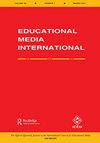Shared values and beliefs of classroom teachers who operate as transformative intellectuals in online communities
IF 1.4
Q2 EDUCATION & EDUCATIONAL RESEARCH
引用次数: 0
Abstract
ABSTRACT Online communities have the potential to help teacher education programs inform and prepare future teachers to teach children equitably and confront social injustices. The purpose of this study was to gain a better understanding of the shared values and beliefs of teachers who operate as transformative intellectuals in online places. Findings were categorized based on the topic domains of interview questions. The study included six participants from two social-justice and human-rights oriented online communities of teachers, #SaturdaySchool and #EduColor. Three data sources, a demographic survey questionnaire, individual interviews, and fieldnotes, were used to answer the research question. Findings suggested that participants in both communities think that teachers should have access to and participate in online places in which teachers, teacher-educators, and activists engage in social-justice and human-rights work. The findings demonstrated that participants thought it was essential to have a venue for ongoing and reflective conversations. Additionally, the findings suggest that participants in both groups view their communities as places to challenge what they have learned in the past, connect with other teachers, and share professional experiences. Participants also view both communities as sources of encouragement and places to feel vulnerable.作为在线社区变革知识分子的课堂教师的共同价值观和信仰
在线社区有潜力帮助教师教育项目,为未来的教师提供信息和准备,使他们能够公平地教育孩子,面对社会不公正。本研究的目的是为了更好地了解在网络环境中作为变革知识分子的教师的共同价值观和信仰。调查结果是根据面试问题的主题领域进行分类的。这项研究的六名参与者来自两个以社会正义和人权为导向的在线教师社区,#星期六学校和#教育色彩。三个数据来源,人口调查问卷,个人访谈和现场笔记,被用来回答研究问题。调查结果表明,两个社区的参与者都认为教师应该能够访问并参与教师、教师教育者和活动家从事社会正义和人权工作的在线场所。调查结果表明,参与者认为有一个场所进行持续和反思的对话是至关重要的。此外,研究结果表明,两组参与者都将他们的社区视为挑战他们过去所学知识,与其他教师联系并分享专业经验的地方。参与者还将这两个社区视为鼓励的源泉和感到脆弱的地方。
本文章由计算机程序翻译,如有差异,请以英文原文为准。
求助全文
约1分钟内获得全文
求助全文
来源期刊

Educational Media International
EDUCATION & EDUCATIONAL RESEARCH-
CiteScore
3.20
自引率
0.00%
发文量
10
 求助内容:
求助内容: 应助结果提醒方式:
应助结果提醒方式:


